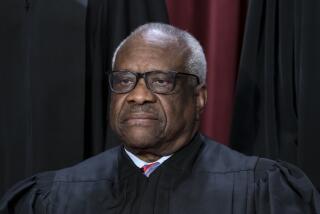You Don’t Miss Your Ethics Until They Are Long Gone
- Share via
Ethics, a publication of the Josephson Institute of Ethics, attempts to keep score on moral practices in our society, reporting gross breaches in various fields--politics, law, education, journalism and sports, among others.
Of course ethical conduct usually goes unnoticed; its absence is much easier to observe and document. It’s a case of good news being no news. By definition, ethics is “the system or code of morals of a particular person, religion, group, profession, etc.”
From the magazine’s reports, ethics seems to be more honored in the breach than in the observance.
In report to the secretary of defense, a group of newspaper editors and publishers complained that reporters covering the Gulf War were threatened and put under military arrest, and their copy was “sanitized” for political rather than military reasons.
Col. David Hackworth, the most decorated soldier in Vietnam, was quoted as saying: “I had more guns pointed at me by Americans or Saudis who were into controlling the press than in all my years of actual combat.”
Commenting on the media’s handling of crime, Ethics said they rely less on the Constitution than on the Ten Commandments, although not on all. “ ‘Thou shalt not steal’ is much less interesting than ‘Thou shalt not commit adultery.’ ”
It estimates that thousands of homeowners have been victimized by fraudulent foreclosers and home-equity swindles that cost title insurers more than $200 million a year.
A British public-opinion survey indicates that 11% of men and 3% of women would commit murder to become millionaires if they were assured of getting away with it; recent cases in Los Angeles show they’ll do it for a lot less.
When an American airliner crashed in Thailand, thousands of villagers looted the remains of its 223 passengers and crew, tearing up suitcases and stealing watches, wallets and travelers’ checks. Police made no attempt to stop it.
In New York City, though a subway token costs only $1.15, people will go to extremes to avoid the fare. They will vault over or squirm under entry gates, enter through exit gates, or suck tokens out of coin slots. One of every 13 riders sneaks in, costing the city $80 million a year.
Newspapers in New Delhi and Bombay recently carried advertisements offering doctoral degrees from UCLA for a written thesis and a fee of $2,000 to $5,000. While the degrees are forgeries, some applicants are believed to have used them to get teaching jobs in India.
A fired University of Miami official admitted faking hundreds of financial-aid forms for needy students and charging kickbacks to feed his cocaine habit.
The Bush Administration, after estimating the cost of the savings and loan bailout at $130 billion for two years, has raised it to $160 billion. And rising.
Since democracy was restored in the Philippines in 1986, 32 journalists have been murdered. Teodoro Benigno, a respected columnist, said, “It’s very hard for journalists to be honest in a system where so many are dishonest. Our politicians, our elite, are not exactly paragons of virtue.”
Computer crime is widespread and insidious. Directions for manufacturing illegal drugs, for picking locks, for breaking into computer systems and for causing rail transit systems to crash have been found on electronic bulletin boards.
In Chicago an employee of Encyclopaedia Britannica who had been fired logged into the encyclopedia’s data base and altered some texts, changing Jesus Christ to Allah and inserting the names of company executives in strange places throughout the text.
His intrusion was discovered in time.
We are used to crime and malfeasance, but the failure of ethics that I find most reprehensible is that of the captain of the cruise ship Oceanos, which sank off the coast of South Africa. He was accused by passengers of taking one of the first rescue helicopters off the ship and leaving them behind on the sinking ship. The captain defended himself by saying, “When I order ‘Abandon ship,’ it doesn’t matter what time I leave.”
It is perhaps the most enduring traditions of the sea that the captain of a sinking ship does not have to go down with the ship, but he must not leave it until the last passenger has left.
Who can forget the story of the Titanic, the “unsinkable” British liner that struck an iceberg in the North Atlantic on the night of April 14-15, 1912, and sank in icy waters with the loss of 1,517 lives.
There were many acts of heroism that night, and some of cowardice; the ship’s band played “Alexander’s Ragtime Band” on the tilting deck while its 2,224 passengers tried to squeeze into too few lifeboats.
I’m sure it never crossed Capt. Edward J. Smith’s mind to abandon ship while passengers were aboard, and, indeed, he went down with his ship.
That’s ethics.
More to Read
Sign up for Essential California
The most important California stories and recommendations in your inbox every morning.
You may occasionally receive promotional content from the Los Angeles Times.













